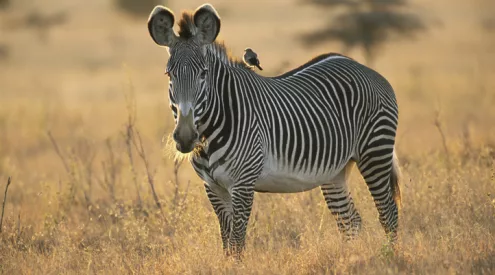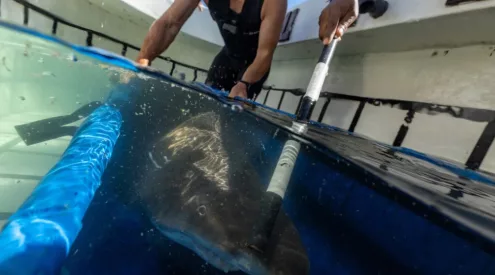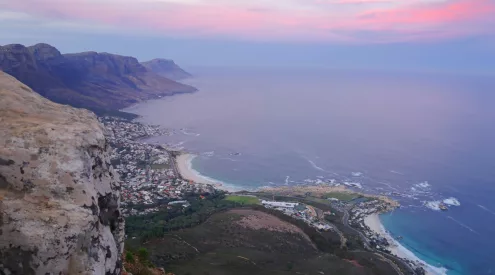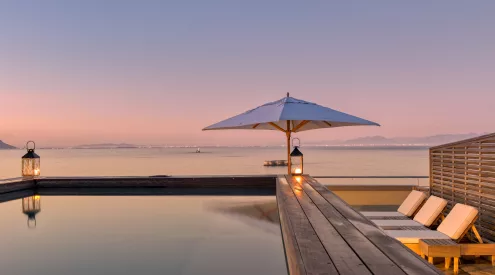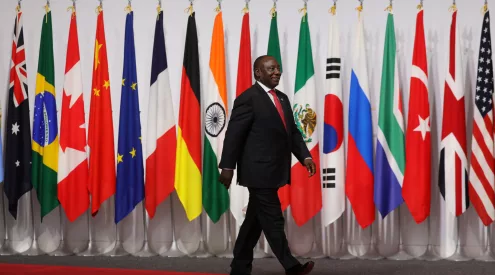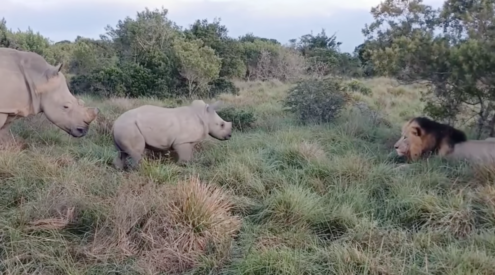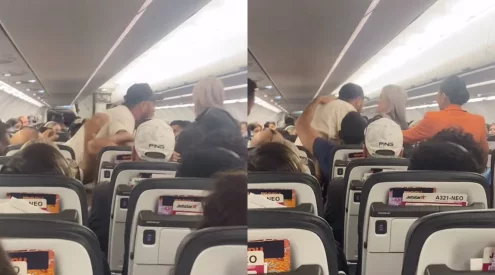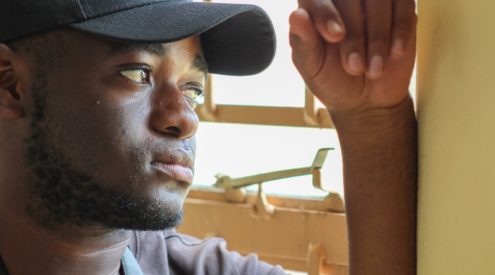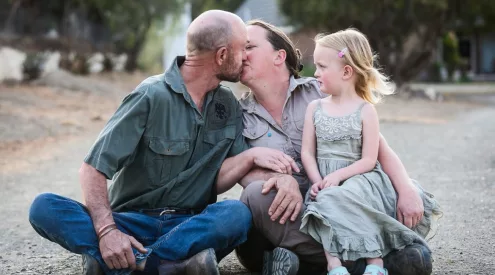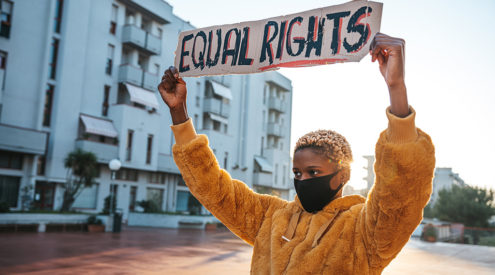For some, South Africa’s hottest destination can feel like a cold, unwelcoming place.

Cape Town starts to light up as the sun sets behind Table Mountain. Photo by Teagan Cunniffe.
If the world’s travel destinations were high school, Cape Town would be that kid at prize-giving who walks up to the stage to accept an award every two minutes. At the end of the ceremony, Cape Town would be weighed down by trophies and her parents (Cape Town’s residents) would take endless selfies with their over-achieving child, beaming with pride and joy.
Cape Town was the winner of New York Times’ 52 Places To Go in 2014, the best city to visit in the Telegraph Travel Awards in 2014, beating the likes of Vancouver, Venice and New York, and was most recently named one of the top 15 places to visit in 2015 by Condé Nast Traveler.
However, over the last several months it’s been hard to ignore stories of racist incidents black South Africans ‒ both residents and visitors ‒ have experienced in the Mother City. The thrust of these stories is that those affected have not felt welcome in the city.
Let me share a personal story. A group of friends and I went to a steak restaurant in Cape Town last year. We were the only group of black diners in the restaurant ‒ a common feature of Cape Town eateries. As the night wore on, the waiter started harassing us to settle the bill despite the fact we were not yet done. No other table around us was receiving the same treatment. As we left the restaurant, the owner’s eyes followed us and at the door, he asked, ‘Where are you guys from?’
I resisted the urge to answer, ‘Africa. Where are you from?’
Tone is hard to judge, but the experience at the restaurant and the ‘Where are you from?’ question made me and my friends uncomfortable. It was as though seeing people like us was a rare occurrence, as though we were something alien.
We rang in the New Year, not only with hangovers but with the news that one of Cape Town’s top hotels, the Twelve Apostles Hotel and Spa, was being accused of racism after a black patron trying to book a table at its restaurant over the phone was turned down, but a minute later a white friend was accepted for the same time and same number of people. The hotel vehemently denied the accusation, saying it was a mix-up and that they do welcome all. Then MTV Base presenter Nomuzi Mabena was recently in Cape Town for SA’s premier horse race, the J&B Met. When she was leaving Cape Town International Airport to return to Johannesburg, she tweeted: ‘Was just called a baboon at the airport in CPT.’
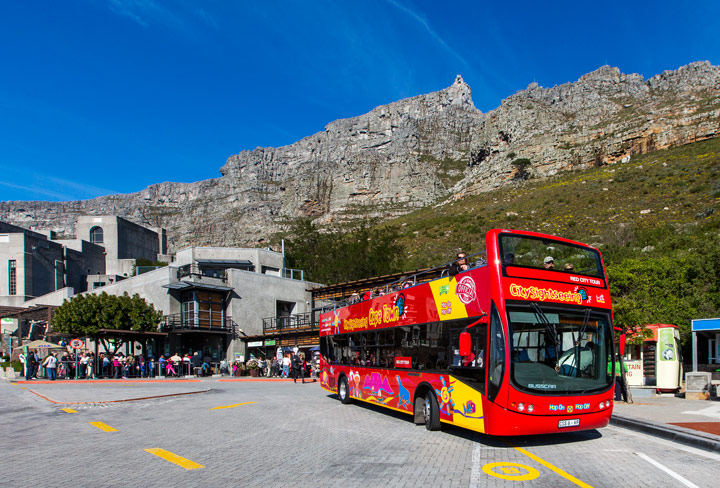
Cape Town Tourism has worked hard to ensure the city is seen as an ideal travel destination. As a resident of the city for the past four years, driving around Cape Town and seeing the open-top red tourist buses emblazoned with the slogan, ‘You don’t need a holiday, you need Cape Town’ is part of my daily commute. Even the enormous photograph of Cape Town mayor Patricia de Lille’s outstretched arms at the domestic arrivals of Cape Town International Airport makes one feel like you’re being welcomed into utopia. This is clearly not the case for all.
However, Cape Town Tourism CEO Enver Duminy says the organisation hasn’t received any complaints from people saying they’ve felt unwelcome in the city.
‘We have had the opposite experience through our social media platforms and feedback channels. If we were to receive a complaint we would take it very seriously and act on it immediately via our dedicated feedback procedure,’ Duminy says, ‘[which] allows for both the complainant and the recipient of the complaint to provide input before moving into the resolution phase.’
I didn’t feel the need to lodge an official complaint or write a bad review about my poor restaurant experience. I just carried on with life. I wonder how many others choose to respond in this way.
Nomuzi Mabena said, ‘I’m very quick to remove myself from situations like that. Never ends well. So I walked away, didn’t even say a word.’
Should she have reported it to Cape Town Tourism instead of leaving it? Perhaps the best reaction is to not brush it off but pursue it in a formal space.
Duminy does agree that more attention is needed for solutions around so-called ‘negative’ tourism experiences.
‘Racism goes beyond a tourism campaign. It is an in-depth and complex issue we need to deal with collectively as a society and tackle head-on instead of passing judgment based on the colour of skin. Travel is one of the best ways to broaden your mind and perspective and we hope that as more people travel, the world will see less racism.’
I certainly hope so, as it seems right now people feel more empowered to tweet or write about their experience than file a formal complaint.
What Cape Town Tourism says
CEO Enver Duminy commented on the incidents of racism shared on social media.
‘We have become aware of these incidents through the media and social media and each time they happen we are very disappointed and frustrated… Accusations, perceptions and/or actual racially driven incidents do not only affect the tourism economy. They also spill over into other sectors such as retail and, ultimately, have a potentially detrimental effect on our economy. On a recent business trip to New York, I observed that the issue of racism in this First World, highly sought-after destination was still very prevalent. While I am not suggesting this makes it okay here or that we simply sweep this issue under the proverbial rug, I don’t believe that racism is either specific to Cape Town or a general attitude of the people living here. South Africa is still undergoing a period of transition from a very painful past and the observation of someone’s race at first meeting or engagement is often an inherent and almost default reaction. I look forward to a time when we are able to move beyond this as a society.’
This article first appeared in the April 2015 issue of Getaway Magazine.

